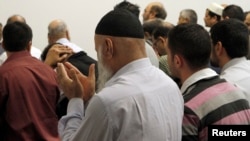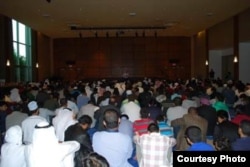A federal civil rights complaint against a Wisconsin manufacturing company that allegedly fired 15 Muslim workers for religious reasons is one of four such cases pending with the U.S. Equal Employment Opportunity Commission (EEOC), and one of 68 the agency has resolved over the last 10 years.
Since 2006, the EEOC has heard Muslims' allegations of religious discrimination against companies of various sizes and in different sectors, including corporate giants such as McDonald's, Merrill Lynch, Rite-Aid Pharmacy, UPS and Wal-Mart.
A national survey has indicated religious discrimination is increasing in American workplaces. The Tanenbaum Center for Interreligious Understanding found there was an 87 percent increase in the number of religious discrimination complaints filed with the EEOC between 2004 and 2014.
"Workplace discrimination against Muslims can be seen as an extension of the bias that Muslims face in society in general," said Rabiah Ahmed, spokeswoman for the Muslim Public Affairs Council (MPAC), a civil rights organization. A bias against a person's race, gender, religion, age or disability "could affect the way he or she is treated or judged by others in a workplace setting."
Prayer time
The latest complaint was submitted to the EEOC on Wednesday by the Council on American-Islamic Relations (CAIR), a Washington-based Muslim American civil rights group. The grievance was filed on behalf of 15 Muslims who were fired from a Wisconsin manufacturing company after the company stopped allowing the Muslims to take unscheduled breaks for prayer.
The complaint alleged Ariens Company, an outdoor power equipment manufacturer based in Brillion, Wisconsin, fired 15 Somali Muslims after the company stopped allowing them to take unscheduled breaks for prayer, a violation of Title VII of the Civil Rights Act of 1964, which prohibits employers from discriminating against employees on the basis of religion, sex, race, color and national origin.
Ariens had allowed some Muslim workers to take brief, preapproved prayer breaks but started enforcing a policy in January that allowed only two 10-minute prescheduled breaks, the complaint said.
Because observant Muslims are required to pray five times daily at specific times, some Muslim employees asked the company for flexibility, according to the complaint. It added that the company refused to consider the request and ultimately fired the employees.
"The dispute results from Ariens' complete refusal to engage in discussion regarding its religious accommodation policies," said CAIR attorney Maha Sayed.
In a statement, Ariens said 27 Muslims are currently employed at the company, which "continues to accommodate them in prayer rooms. We respect their faith and we respect the work they do."
Muslim numbers
The EEOC, along with the National Labor Relations Board, will investigate the complaint. If the EEOC chooses not to litigate, it could give the employees the option to file a lawsuit, according to Sayed.
Meanwhile, the size of the Muslim population in the U.S. has undergone "steady growth," according to the Pew Research Center, which began estimating the U.S. Muslim population in 2007. In 2015, there were about 3.3 million Muslims living in the U.S., or about 1 percent of the country's total population. By 2050, Pew projects the Muslim population will reach 8.1 million, or 2.1 percent of the total population.
As the Muslim population grows and American workplaces become more diverse, "employers must be aware of [employees'] rights and obligations with respect to providing religious accommodation," wrote attorneys Robert Hutton and J. Gregory Grisham, co-authors of Religious Accommodation in the Workplace: Current Trends Under Title VII.
"Doing so upholds the values of our nation and also makes for healthy work environments that promote respect and understanding,” said Ahmed of the MPAC.





